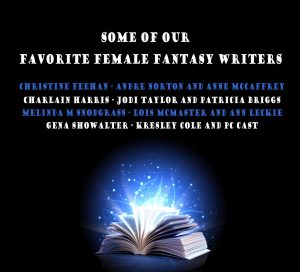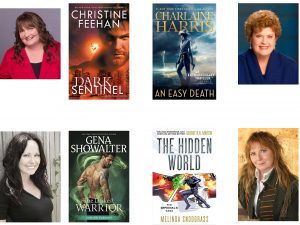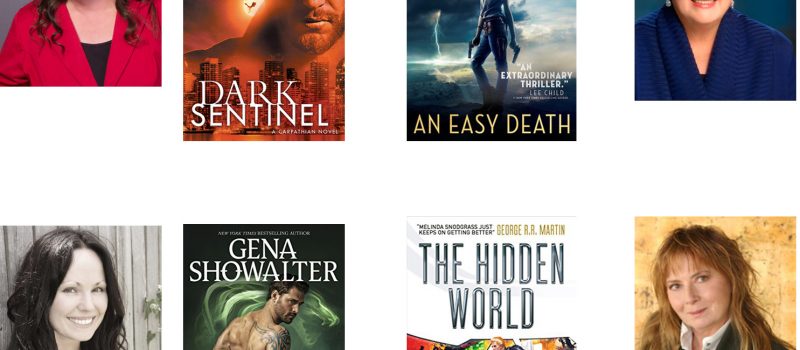Roundtable Guest Post by Christine Feehan, with Charlaine Harris, Gena Showalter and Melinda M. Snodgrass–“The Evolution of Acceptance of Women Writing Fantasy and Science Fiction”
As women writing fantasy and science fiction today it’s exciting to see so many female writers of this genre, to see more support for women and continued successes. As a writer of paranormal, fantasy, and science fiction since the 1990s, I’ve found a welcoming home in this genre over the years. I’ve invited some of my friends and colleagues to join me in discussing what it’s like to write in this genre now and in the past and how their careers have evolved. And, what they see as the future for women writing in fantasy and science fiction.
Charlaine Harris, who has been publishing since 1981, recalls some of the difficulties she encountered as a mystery writer and how happy she was writing fantasy including her Sookie Stackhouse series which was turned into an HBO series called True Blood.
Charlaine writes:
“I started out in another genre, mystery. At the time my first book was published (1981), there was a lot of division in the mystery community between the hard-boiled writers (mostly men) and the so-called ‘cozy’ writers (mostly women). If you didn’t write thrillers or hard-boiled, you were a lesser writer. As a traditional mystery writer (a term I prefer to ‘cozy’) I understood I was in a low position on the ladder. Though most writers were perfectly pleasant, I was openly patronized on more than one occasion.
“I didn’t like it.
“I began working my way up when I wrote the Lily Bard books, which were very serious short crime novels about a rape survivor who is fully capable of taking care of herself. The Lily Bard books didn’t sell extremely well, but they did make me feel that I was rising up in the regard of my peers. Well, I considered them my peers. I believe most of them felt they were my superiors.
“My career wasn’t accelerating, though. I was torn. I didn’t want to write hard-boiled, noir, thrillers, whatever you wanted to term the genre. I was getting restless with the (then) strict boundaries of the mystery.
“During one of the happiest periods of my writing life, I wrote the book of my heart, about a waitress who has a hard life because she’s telepathic. Finally, Sookie meets someone she can date without knowing his every thought… because he’s dead. I had found a new voice, and I knew what I wanted to say with it. This new field, which included fantastic elements contrasted with an everyday world, gave me that opportunity.
“It turned out to be called ‘urban fantasy,’ and I turned out to be one of the first writers in the sub-genre.
“I still write conventional mysteries from time to time, by the way, and I still have many friends in the mystery world. I’m glad to say that due to the influence of Sisters in Crime, which exists to correct inequities in the genre, there’s more harmony in the mystery world.
“My new series is not urban fantasy, because I became restless again. It’s another form of fantasy, alternate history. An Easy Death uses alternative history as the backdrop of the series. America didn’t survive the Depression intact. The country became fractured and the USA divides into different countries.
“Why does fantasy excite me so much? Because it’s such a great vacation from reality. I do have themes in my novels, and I have an agenda (or two), but I am no preacher. Instead, I consider myself an entertainer. If I can broaden readers’ point of view with my work, I want to do that—but first and foremost, I want to excite readers and take them away from mundane matters for a while. I want them to experience the adventure and danger in a world where magic is possible, where all the individuals you meet may not be strictly human, where the unexpected is around every corner. That’s my world.”—Charlaine Harris

One thing that bestselling author Gena Showalter found was that encouragement from other writers made a difference for her.
Gena writes:
“Over the years, I have learned many lessons about my writing and the publishing world. Sometimes through trial and error, sometimes through blessing alone. (Some would call it luck.) One thing has been proven true time and time again: I couldn’t have done it without friends.
“I have made the most incredible friends during the span of my career. People who understand this crazy business, and the many highs and lows. Two of those friends are New York Times bestselling author P.C. Cast and New York Times bestselling author Kresley Cole. Both ladies have given me amazing writing advice.
“P.C. told me to treat my writing like a job. (A job I loved, yes, but a job all the same.) When an author is on deadline, she must write even when she’s uninspired, even when she’d rather be doing absolutely anything else. Miss a deadline, and you might not get paid. I took those words to heart, and they have served me well. If I waited for inspiration to strike, I would not be even half as productive.
“Kresley’s advice came during a brain-storming session about my hero and heroine. She asked me a question I would later ask myself every time I started writing a new book. ‘Why are these two characters meant for each other, and no other?’ I have utilized that question in every area of my writing. Why this world for these characters? Why this plot? Why this magical ability? (Or whatever happens to apply at the time.) The answers help me craft my world and my characters—so that I can better destroy them.
“These wonderful women have changed my life and writing, and I will forever adore them. Now, I give female writers of fantasy the same advice. Write like it’s a job, and always know why the pieces of your story fit together.”—Gena Showalter
More and more male colleagues and readers are encouraging, supportive and inclusive to women authors as fantasy writer Melinda M. Snodgrass shares.
Melinda writes:
“I owe both my prose career and my Hollywood career to two men who encouraged and supported me in my efforts. I was a deeply unhappy lawyer, and my friend Victor Milan said to me ‘I bet you could write if you tried.’ So I started trying in secret and I’d meet Vic at the Vip’s Big Boy on Fourth Street at midnight (I don’t know why we picked that hour, but we did), and he’d read over my work and give me pointers on how to make it better. The result was that I began to sell.
“Fast forward a few years and my friend George R.R. Martin had gone out to Hollywood and one day he called and said ‘Hey, Snod, I think you’d be good at this screenwriting thing. If you write a spec script I’ll show it to my agent.’ He then advised me on how to pick a show to write for, and told me how the business worked. So I did and Star Trek bought that script, and hired me so that encouragement from George launched my Hollywood career.
“The thing I’ve always loved about science fiction is how more established writers always pay it forward and give a helping hand to new younger writers. The advice I would give new women writer’s entering the field is to find that mentor whether male or female. They should be somebody established, but not so advanced in their career that you feel intimidated to work with them.”—Melinda M. Snodgrass
And now a few words from me:
“I’ve been publishing since 1999 and I’m encouraged by the growth of male readers and the number of letters I receive from them. I feel encouraged that the research and details are appreciated. I think there’s been a stigma over the years that women write primarily emotional stories, but many women writers do extensive research for their novels and are concerned with the believability of their worlds.
“In addition to research I include social issues that are important to me. I weave them into the story in a way that I hope encourages empathy, conversation and awareness. Everything from women’s issues to autism and PTSD. There’s a wide variety of social issues that I can touch on through character and story without it being in-your-face or preachy, but keeping it meaningful. I can do all of that and still write quality work that hits the bestseller lists and wins awards.
“We do still run into the occasional patronizing writer/reader of course, but prejudice is slowly being replaced by acceptance.”—Christine Feehan
Women fantasy and science fiction writers have come into their own, writing bestselling, award-winning and conversation-starting stories over the years. There’s been a marked increase of Hugo Award winners since 2010, which is encouraging. And their story topics and issues are varied and without barriers.

More women are being nominated for Hugo Awards (https://www.kith.org/jed/hugo-stats-author-gender/) and we see so many hitting bestseller lists. Collectively, we want to encourage women writing fantasy and science fiction to put their work forward for awards, and to find ways to support one another and to celebrate every milestone. We are women who are inviting, welcoming, and supporting each other in a genre where there’s great company and more room.

Christine Feehan (https://www.christinefeehan.com/) is a #1 New York Times bestselling author, with 75 published works in seven different series: Dark Series, GhostWalker Series, Leopard Series, Drake Sisters Series, Sea Haven Series, Shadow Series, and Torpedo Ink Series. All seven of her series have hit the #1 spot on the New York Times bestseller list. Judgment Road, the first book in her newest series, Torpedo Ink, debuted at #1 on the New York Times bestseller list.
Charlaine Harris (http://charlaineharris.com/) is a native of the Mississippi Delta. Charlaine has lived her whole life in various southern states. Her first book, a mystery, was published in 1981. After that promising debut, her career meandered along until the success of the Sookie Stackhouse novels. Now all her books are in print, and she is a very happy camper. She is married and has three children.
Gena Showalter (https://genashowalter.com/) is the New York Times and USA Today bestselling author of the spellbinding Lords of the Underworld, Otherworld Assassins, and Angels of the Dark series, as well as two young adult series: Everlife and the White Rabbit Chronicles. In addition to being a National Reader’s Choice and two time RITA nominee, her romance novels have appeared in Cosmopolitan and Seventeen magazine.
Melinda M Snodgrass (http://melindasnodgrass.com/ ) was a story editor on Star Trek: The Next Generation. Her acclaimed episode, “The Measure of a Man”, was nominated for the Writer’s Guild Award for outstanding writing in a drama series. With George R. R. Martin, she co-created and co-edits the popular Wild Cards series of shared-world novels. She has written several series that run from fantasy to science fiction including the Linnet Ellery series, The Imperials Saga, her Space Opera series for Titan Books starting with The High Ground, and the Edge series. When not writing novels or working in Hollywood, she is the executive producer on the upcoming Wild Cards TV series, she rides her dressage horses and plays video games.








Love all of these authors! It’s really encouraging to know there’s more room for female scifi and fantasy writers!